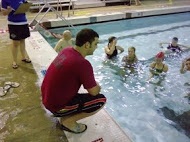
There are many life guard health hazards that you need to know. Lifeguards play a very important role of ensuring that high safety standards are met at swimming pool or beach settings. They help people who may drown or face other medical emergencies in water settings. If you work as a lifeguard or aspire to be one, it is important to note that you are also under high risk of hazards. Here are some of the lifeguard health hazards you should be aware and prepared to face.
Drowning
In most cases the duties of lifeguards involve rescuing people who may have drowned in the swimming pool or other water bodies. They are trained how to deal with such incidences and also how to carry out rescues and assists. During assists, lifeguards should assist a distressed swimmer while still watching others to avoid more accidents. While performing rescues, a lifeguard must be able to jump into the water and help the victim out of danger. This puts them in high risk of drowning too. This is because the distressed victim may be heavy leading to drowning of the lifeguard. Drowning may also occur while carrying out recues in weedy or deep waters because in such situations, the rescues are very demanding. Drowning is one the most common lifeguard health hazards that every lifeguard must be aware of.
Heat and sun exposure
If you work as a lifeguard on a beach or outdoor pools, you have a high risk of suffering from the long hours of exposure in hot weather. The hot and humid condition on the beach increase risks of diseases such as heat stroke or heat exhaustion. The exposure to the heat also increases the risks of dehydration. In order to prevent heat related lifeguard health hazards, it is advisable to drink a lot of water, cool off when taking a break or eat light snack or meals.
Lifeguard health hazards while providing first aid
Lifeguards must offer first aid to guests regularly. During this process a lifeguard may be exposed to hazards such as infectious diseases or other communicable diseases. This calls for a need to wear protective gear when treating injuries or wear gloves while treating emergencies such bleeding nose or use a mask when conducting rescue breathing or CPR.
Other lifeguard health hazards include the risk of inhaling toxic chemicals or chemical burns. Thus, when handling pool chemicals, lifeguards must always wear protective equipment. The chemicals need to be checked by a trained person who knows how to handle the chemicals in a safe manner.